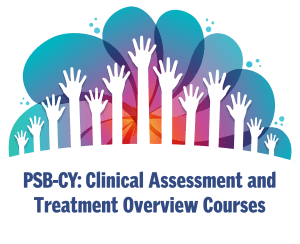The Problematic Sexual Behavior of Children and Youth (PSB-CY): Clinical Assessment and Treatment Overview courses provide professional development for clinically assessing, responding to, and treating PSB-CY. These courses were created from evidence-based best practices and focus on youth between the ages of 9 and 14 with problematic sexual behaviors (PSB).

- This event has passed.
Problem Sexual Behavior in Children and Youth: Clinical Assessment and Overview Course Series
March 20, 2023 @ 8:00 am - 5:00 pm CDT


Problem Sexual Behavior in Children & Youth: Clinical Assessment and Overview Course Series
Course Details:
Ages 9-14 are the typical age groups most commonly seen on military installations. Adjustments to the approaches described throughout this course series would need to be made for children younger than, or adolescents older than, this prescribed range. Remember that these courses are designed to always ensure you are approaching youth using developmental, cognitive, and age-appropriate language. The information presented may also be useful for nonmilitary families and their children.
Please Note: Child, children, and youth will be used interchangeably to describe this age range (9-14). Additionally, caregivers are usually, but not always family members (e.g. parents or guardians).
Courses in this Series
View each course page for a full course description and additional information pertaining to the course.
Course 1 | Clinical Assessment of Children and Youth with Problematic Sexual Behavior
This course provides an overview of the clinical assessment process when a child or youth has engaged in PSB. NOTE: We suggest planning additional time for this course as it is the longest in the series.
Course Authors: Julia Grimm, LISW-CP, and Sue Righthand, Ph.D.
Course 2 | Caregiver Engagement in Assessment and Treatment
Explore the vital role caregivers play in the intake assessment, treatment, and safety planning for their children.
Course Author: Renee Roman, LMSW
Course 3 | Clinical Decision-Making and Treatment Planning
Build on an understanding of youth PSB and the individual, family, social, and community vulnerabilities and protective factors for PSB.
Course Author: Ben Sigel, Ph.D.
Course 4 | Monitoring Safety Planning, Supervision, and Treatment Progress
Discover strategies for determining what level of care is best to meet the youth with PSB needs and the safety of others.
Course Authors: Paul Shawler, Ph.D., and David Kolko, Ph.D.
Course Structure
Each course has been designed by experts in the field, is self-paced, and is packed with valuable information, reflective activities, and resources for service providers. These courses are sequential and developed to be experienced in order. Each course will take the average learner around 90 minutes to complete. Please plan to complete each of the four courses as each builds upon the next.
Supplementary Material
Before taking these courses, we highly recommend watching all previous webinars in the SBCY series. Specific webinars have been designated as prerequisites for some courses. Check each course page for those recommended learning events. Continuing education credits from select credentialing agencies are available for each session!
Continuing Education Credit
Each course in this series has been approved to offer 1.5 CE credits from the following credentialing agencies:
-
- The University of Texas at Austin, Steve Hicks School of Social Work (SHSSW)
- The Commission for Case Manager Certification (CCMC)
- The National Council on Family Relations (NCFR)
- The Ohio Nurses Association (ONA), an approver of nursing continuing professional development by the American Nurses Credentialing Center’s Commission on Accreditation
- Certificates of Attendance are available for those interested in documenting professional development hours!









